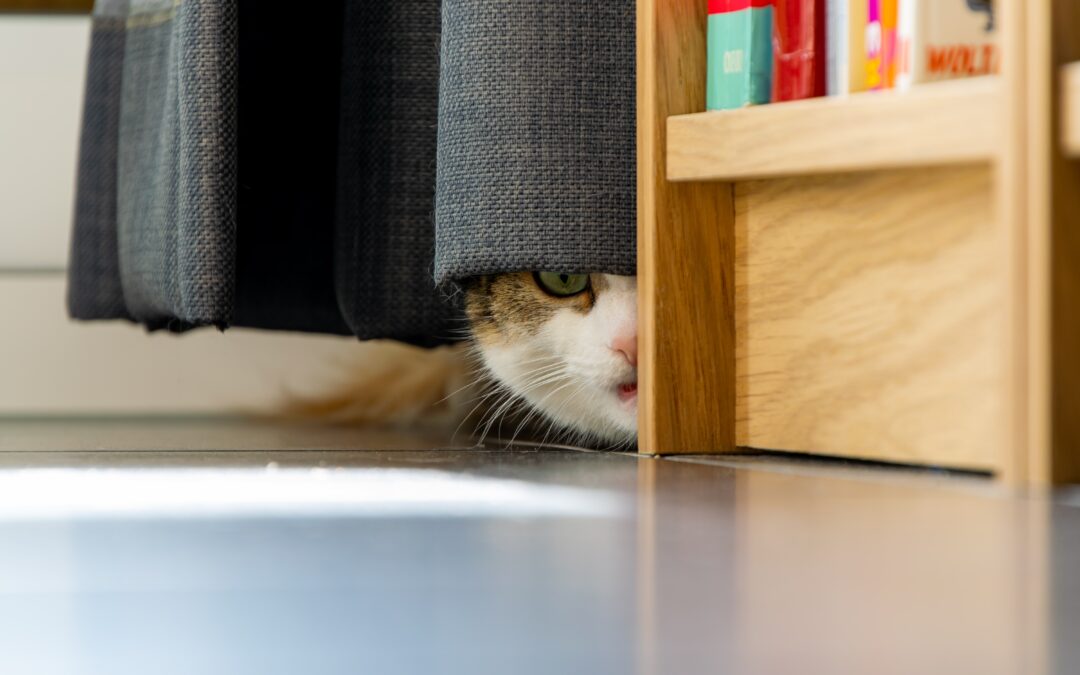Happy Birthday, USA!
The Fourth of July is right around the corner and with it comes all the traditional celebrations: picnics, barbeques, and fireworks. Although many enjoy them, not everyone – a person or animal – does. In fact, more pets are lost around July 4th than at any other time of year. Noise anxiety – especially fireworks and even thunderstorms – is very real. It can also be manageable.
Off Like a Shot
Nearly 50% of dog owners report that their dog reacts negatively to loud noises including fireworks. A dog frightened by unexpected and, to them, inexplicable sounds, may engage in behavior harmful to themselves, others, or property, or even run away. A pet afraid of extreme noises like fireworks can react by running for miles and miles and miles, ending up far away from you and their home. They may, quite literally, take off like a shot.
Symptoms of Noise/Fireworks Anxiety
Your pet may react involuntarily to unexpected loud noises, displaying somatic, or physical symptoms of distress, which may include:
- Panting heavily
- Shaking
- Salivating excessively
- Rapid heartbeat
- Pacing
- Destroying objects
- Urinating or defecating uncontrollably
- Begging for comfort from their person or people
Your pet’s reaction is completely out of their control and is quite common. If your dog is reactive to storms or other loud noises, there’s a very high likelihood that they’ll have anxiety about fireworks. Dogs and other animals with noise anxiety are likely to exhibit anxiety in other areas, too, including separation anxiety. Similar to anxiety in humans, anxiety in dogs has a genetic component, so anxious reactions are not in the control of the canine (or human) experiencing it.
Managing Noise Anxiety
There are ways to manage your pet’s noise anxiety, including behavioral and medical management. To start, you might:
- Make sure your dog has gone out to relieve him/herself before the fireworks start
- Give your pet a place to hide like their crate or under a piece of furniture
- Close windows and doors to help minimize the noise they’re exposed to
- Stay home to comfort your pet
- Use something like an anti-anxiety vest or shirt to help minimize physical responses
- Play white noise or classical music for its calming effect
- Remain calm, patient, and loving toward your pet
- Make sure your dog has identification on their collar or is microchipped
If your pet’s noise/fireworks anxiety isn’t appeased by these first-line treatment methods, there are other options available to help. For example, some pets respond well to behavioral training like desensitization or counter-conditioning. Desensitization training might include extremely gradual exposure to the noise your pet is afraid of while counter-conditioning means pairing the feared experience with a pleasant one. South Hyland Pet Hospital in Minneapolis, MN provides behavioral counseling to help your pet learn to manage their noise anxiety.
There are also medications available as part of a treatment plan for noise anxiety. Your pet may need a combination of environmental, behavioral, and medical support to be able to function during a particularly noisy holiday or event.
South Hyland Pet Hospital
At South Hyland Pet Hospital, our motto is caring hearts and caring hands. We truly want to help your pet survive and learn to thrive despite their instinctive reaction to fireworks or other noise. We can be reached at 952-884-1868 or by email at southhyland@southhyland.com. We’re happy to help you find ways to manage your pet’s anxiety.
Image credit:



